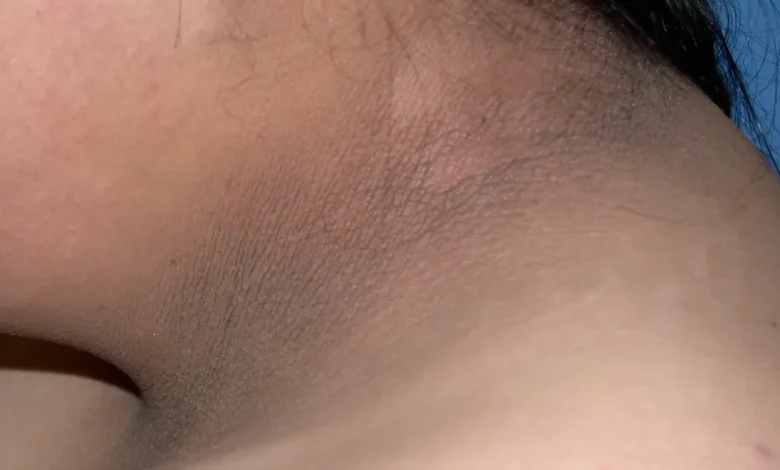Acanthosis Nigricans Symptoms, Causes, Diagnosis and Treatment

What is acanthosis nigricans?
A skin condition, acanthosis nigricans is characterized as velvety discoloration and dark areas in body creases and folds. Moreover, your affected skin can smell bad and may become thickened. Quite often, the condition affects your neck, groin and armpits. Normally, such skin changes tend to occur in individuals who have diabetes or are obese. People with acanthosis nigricans have chances to develop (type 2 diabetes). Rarely, the condition can be the signal of liver or stomach cancer. The disorder is quite common particularly in Hispanics, blacks and Native Americans. Unfortunately, there is no treatment for it. Though, treating its causal condition can restore some texture and normal color of the affected skin.
What are the symptoms of acanthosis nigricans?
The noticeable symptoms of acanthosis nigricans is the changed skin. A person with the condition can experience thickened, dark, velvety skin particularly in the body creases and folds. Changes in skin can emerge gradually, sometimes taking months or even years. Moreover, your affected skin can also cause itching or smell bad.
What causes acanthosis nigricans?
Acanthosis nigricans is linked with:
- Obesity: majority of individuals who develop the condition are obese or overweight.
- Insulin resistance: people those have the condition gets insulin resistant, insulin is a hormone which is secreted by our pancreas which allows our body for processing sugar. Moreover, insulin resistance causes diabetes (type 2).
- Hormonal disorders: individuals with certain disorders for example underactive thyroids, ovarian cysts or adrenal glands problems can lead acanthosis nigricans.
- Specific medications: drugs for example corticosteroids and oral contraceptives can trigger the condition.
- Cancer: sometimes, the condition strikes after a cancerous tumor starts growing in the internal organ, for example liver, color or stomach.
What are the risk factors of acanthosis nigricans?
Risk factors of acanthosis nigricans include:
- Race: the condition is more common particularly in blacks, Hispanics and American Indians.
- Genetics: certain acanthosis nigrican’s types are hereditary.
- Obesity: clearly, the more heavy a person is, the more chances of developing acanthosis nigricans exists.
What are the possible complications of acanthosis nigricans?
Individuals with acanthosis nigricans have higher risk of developing diabetes (type 2). Few cancer types linked with acanthosis nigricans must also be thoroughly checked.
How is acanthosis nigricans diagnosed?
Typically, a skin exam serves as the basis to detect the disorder. Rarely, the doctors suggest biopsy. In case the underlying cause to trigger acanthosis nigricans tends to be unclear, then your doctor can suggest X-rays, blood tests or few other tests in order to seek possibilities of the underlying causes.
How is acanthosis nigricans treated?
Treating the causal problem may help your skin discoloration to fade or clear in many cases. Such as:
- Take medications for the causal problems.
- Lose weight.
- Surgery of tumor in case the disorder is caused by it.
Few medical treatments of acanthosis nigricans include:
- Topical antibiotics or antibacterial soaps for reducing the odor.
- Prescribe creams that can lighten your affected areas.
- Oral acne drugs.
- Laser therapy for reducing the thickness of skin.
By : Natural Health News




